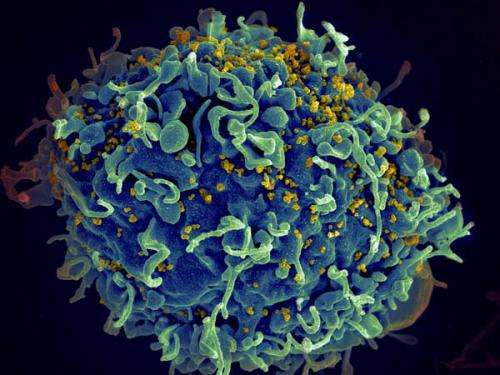PrEP data links anti-HIV immune response to reduce chance of infection

Research published in the Proceedings of the National Academy of Sciences found that some individuals exposed to HIV-1, but who remain uninfected, have a certain pattern of virus-specific immune responses that differentiated them from individuals who became infected. The findings build upon prior research by studying these responses in the context of a controlled clinical trial, examining a large number of subjects, and by having access to specimens saved before anyone was infected. In the future, this information could be used to assess HIV-1 infection risk or inform the design of a preventative HIV-1 vaccine.
This new research, co-authored by George Washington University (GW) researcher Douglas Nixon, M.D., Ph.D., and colleagues at UCSF, USP in Brazil, and the Gladstone Institutes, looked at data from the Pre-exposure Prophylaxis Initiative (iPrEx) trial, the first randomized controlled trial of pre-exposure chemoprophylaxis (PrEP) in humans. Remaining specimens from the trial were used to test for naturally acquired or induced immunity to HIV-1 infection. Those who became infected typically lacked responses to two HIV-1 proteins. The finding suggests that such immune responses may play a role in blocking systemic infection after exposure to the virus.
"Research has shown that T-cell responses can be observed in virally exposed but uninfected persons," said Dr. Nixon, chair of the Department of Microbiology, Immunology & Tropical Medicine and Walter G. Ross Professor of Basic Science Research at the GW School of Medicine and Health Sciences. "The question that has remained unanswered is whether or not these T-cell responses could be protecting people from acquiring systemic HIV infection. The rigor of the placebo-controlled iPrEx trial gave us access to the necessary data and specimens to address that question. What we found was what people have been looking for, for a long time - a correlation between future infection risk and a measureable immune response."
Using samples from the iPrEx trial, the research team compared immune responses mounted against an array of HIV-1 antigens by peripheral blood mononuclear cell samples: 84 samples were collected prior to infection from men who became HIV-positive and 480 samples from men who remained HIV-negative throughout the trial, including those who received the drug or placebo. T-cell responses against certain HIV-1 antigens were significantly higher and more frequent among those who remained uninfected compared with those who became HIV-positive, and these responses were associated with reduced risk of infection.
"The iPrEX trial showed that pre-exposure prophylaxis (or PrEP) with emtricitabine and tenofovir disoproxil fumarate (brand name Truvada in the United States) was highly effective for HIV prevention when used," said Dr. Robert Grant, of the Gladstone Institutes, the protocol chair of iPrEx which was sponsored by the National Institutes of Health. "Whether taking drug or placebo, the observed immune responses were still present, so the protective benefit we saw with PrEP was not due to these immune responses. The discovery that cellular immunity correlates with HIV infection risk is a distinct and very exciting one. I hope it will provide clues leading to an HIV vaccine."
"Demonstrating HIV protection associated with vaccine or, as in this case, exposure-induced immunity is a very high bar to achieve, and appropriately so. Our findings indicate that the host immune system interfaces with the virus or its proteins more commonly than previously thought, generating naturally induced immunity in the form of T-cell responses that contribute to a persistent HIV negative status in some exposed people. Only with additional research can we truly know if these immune responses can be induced by a vaccine candidate, and whether vaccine-induced responses provide protection," according to Dr. Esper Kallas, of USP, co-senior author of the manuscript.
"A safe, effective, and easily administered preventative HIV vaccine is still needed and remains an important public health goal. HIV's interaction with the human immune system is complex, therefore success with a vaccine is hard to predict. Nevertheless, the possibility that T-cell immunity, in addition to antibody-derived immunity, may contribute to protection is quite promising. The more 'shots on goal' we can take in a given vaccine, the more likely we are to succeed at preventing infection, and perhaps most importantly eventual eradication of HIV," said lead author Dr. Peter Kuebler.
More information: Cellular immune correlates analysis of an HIV-1 preexposure prophylaxis trial, PNAS, www.pnas.org/cgi/doi/10.1073/pnas.1501443112

















